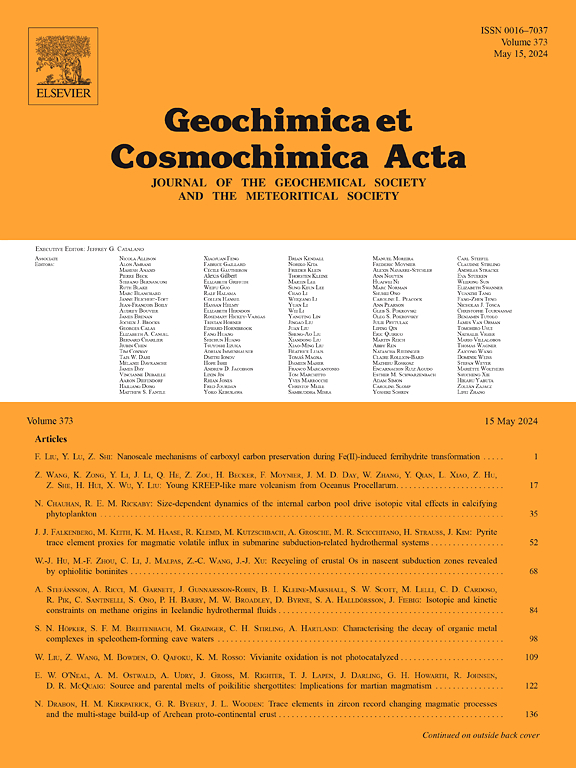Stable and radiogenic strontium isotopes trace the composition and diagenetic alteration of remnant glacial seawater
IF 4.5
1区 地球科学
Q1 GEOCHEMISTRY & GEOPHYSICS
引用次数: 0
Abstract
A remnant of glacial seawater preserved in the pore fluids of sediment cores from the Maldives Inner Sea provided an opportunity to investigate the stable strontium isotopic composition (Sr) of the ocean during the Last Glacial Maximum and explore the usefulness of Sr as a tracer of early marine diagenesis. We used paired measurements of Sr and radiogenic Sr isotope ratios (87Sr/86Sr) in pore fluids and surrounding carbonate sediments to constrain the diagenetic history of the preserved glacial water mass at IODP Sites U1466 and U1468. These pore fluid profiles document variability in Sr in a shallow marine setting, revealing distinct diagenetic processes dominating within different depth intervals. We find evidence for isotope fractionation during secondary calcite precipitation at intermediate depths and observe that in aragonite-dominated settings, fractionation during recrystallization may be obscured by the dissolution of aragonite in the uppermost sediments. Correcting for the effect of carbonate recrystallization on pore fluid Sr concentration ([Sr]) and isotopic composition, we estimate that glacial seawater [Sr] was higher (M) and Sr lower (0.32‰) compared to the modern ocean, consistent with hypotheses attributing the present-day disequilibrium of the ocean Sr budget to glacial/interglacial changes in shelf carbonate weathering and burial. Our results provide evidence that the ocean [Sr] and Sr are sensitive to carbon cycle changes on timescales much shorter than its residence time (2 Myr) and demonstrate that pore fluid Sr measurements are a useful addition to multi-tracer studies of diagenesis in complex marine systems.
稳定锶同位素和放射性锶同位素追踪残余冰川海水的组成和成岩蚀变过程
马尔代夫内海沉积岩芯孔隙流体中保存的冰川海水残余为研究末次冰川极盛时期海洋的稳定锶同位素组成(δ88/86Sr)提供了机会,并探索了δ88/86Sr作为早期海洋成岩作用示踪剂的作用。我们利用孔隙流体和周围碳酸盐沉积物中的δ88/86Sr和放射性Sr同位素比值(87Sr/86Sr)的成对测量来制约IODP U1466和U1468站点保存的冰川水团的成岩历史。这些孔隙流体剖面记录了浅海环境中δ88/86Sr的变化,揭示了不同深度区间内占主导地位的不同成岩过程。我们发现了中等深度次生方解石沉淀过程中同位素分馏的证据,并观察到在以霰石为主的环境中,重结晶过程中的分馏可能会被最上层沉积物中霰石的溶解所掩盖。在校正碳酸盐重结晶对孔隙流体锶浓度([Sr])和同位素组成的影响后,我们估计冰期海水[Sr]比现代海洋高(∼98μM),δ88/86Sr比现代海洋低(∼0.32‰),这与冰期/间冰期陆架碳酸盐风化和埋藏变化导致当今海洋锶预算失衡的假设是一致的。我们的研究结果提供了证据,表明海洋[Sr]和δ88/86Sr对碳循环变化的敏感性在时间尺度上远远短于其停留时间(2 Myr),并证明孔隙流体δ88/86Sr测量是对复杂海洋系统成因多示踪研究的有益补充。
本文章由计算机程序翻译,如有差异,请以英文原文为准。
求助全文
约1分钟内获得全文
求助全文
来源期刊

Geochimica et Cosmochimica Acta
地学-地球化学与地球物理
CiteScore
9.60
自引率
14.00%
发文量
437
审稿时长
6 months
期刊介绍:
Geochimica et Cosmochimica Acta publishes research papers in a wide range of subjects in terrestrial geochemistry, meteoritics, and planetary geochemistry. The scope of the journal includes:
1). Physical chemistry of gases, aqueous solutions, glasses, and crystalline solids
2). Igneous and metamorphic petrology
3). Chemical processes in the atmosphere, hydrosphere, biosphere, and lithosphere of the Earth
4). Organic geochemistry
5). Isotope geochemistry
6). Meteoritics and meteorite impacts
7). Lunar science; and
8). Planetary geochemistry.
 求助内容:
求助内容: 应助结果提醒方式:
应助结果提醒方式:


